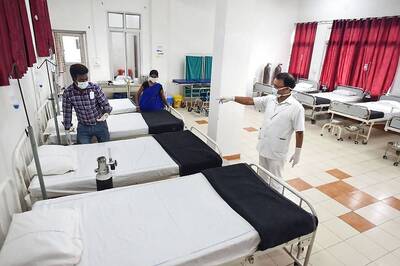
views
The five days I spent in surat covering the worst ever floods in the city would be forever etched in my memory. And there are various reasons for that.The rising water level, wading through neck deep water, people's struggle for clean drinking water and basic food and survival stories that I witnessed. But there is something else which I cannot forget. The increasing intolerance against the media especially the electronic media among common people.
The media by the second day had arrived in full strength and gathered near a hotel at Surat station.About 6 OB vans stood with full preparation as reporters were rushing to uplink all that they had shot during the day.But by the fourth day, one of the glass panes of our OB van had already been smashed by an irate mob. Surat residents were already frustrated and dejected with an inactive and callous administration.Above all, many of them were stuck in different locations with no communication with their families. The frustration had to find an outlet and the easiest targets were the electronic media. Every half an hour, we used to find a group of 10 to 15 people gathering around our OB vans and abusing us for all the sufferings that they were undergoing. Most of them were under the impression that we were sitting in AC hotel rooms and relaying the news without traveling to the interiors. They wanted us to come with them and survey the areas. But since it was not possible to listen to everyone's request, the irate mob started creating roadblocks by creating nuisance. The police had to be called and finally the hotel management asked us to pack our OBs before the mob could damage their property.
But this pattern of targeting the media is not an isolated incident found only in Surat. Be it last years 26th July deluge or the recent Mumbai 7/11 blasts, it can be seen that media bashing has become fashionable. During the bomb blasts, commuter's frustration against lack of security in local trains was diverted against the media, instead of the administration. I witnessed atleast one such incident where a cameraman was nearly manhandled.
But why such intolerance? After all, the electronic crews reach any location quicker, sometimes even before the local administration does. We manage to deliver news faster than any other form of media. Many issues which otherwise would have been swept under the carpet gets highlighted because of the aggressive pursuit of news by the electronic media.
But the criticism is not always unjustified. Many a times, in pursuit of news, journalists often tend to be insensitive. One photographer from a local newspaper got nearly thrashed after he jumped into the compartment to click pictures even before the bodies could be removed.No doubt he was doing his job, but at that time it was more necessary to give them space to help the victims. He could have easily clicked pictures from outside without troubling anyone. Also the constant need to stay ahead of competition makes news channels to sensationalize certain issues which viewers are intelligent enough to discern and dismiss as yellow journalism.
No matter whatever the reasons could be, the media was atleast unjustly targeted in Surat. There was no way we could have parked our OB vans in flooded localities.So it had to be parked in a centralized location which was dry. Also most of the angry men and women failed to understand that while their Chief minister and other politicians surveyed the areas in motor boats and helicopters, reporters at great personal danger were traveling to affected areas in waist and sometimes neck deep water and covering human interest stories. While all of them may not have benefited, atleast the outside world could witness how the city was suffering due to floods. That also resulted in many NGOs from outside the city and state sending relief material to help the stranded residents.
Anyways, I think its time for every TV reporter to be prepared for tough times ahead. A television reporter is easily identifiable with the camera, boom mic and OB vans for company as compared to a print reporter who can survive in anonymity.Maybe we can make it a bit more easier by being sensitive to the feelings of the people and the situation around us. That to me is the only solution. Rest all as they say are the "Perks of being a television journalist".
About the AuthorJency Jacob Straight from Maximum City....Read Morefirst published:August 14, 2006, 18:41 ISTlast updated:August 14, 2006, 18:41 IST
window._taboola = window._taboola || [];_taboola.push({mode: 'thumbnails-mid-article',container: 'taboola-mid-article-thumbnails',placement: 'Mid Article Thumbnails',target_type: 'mix'});
let eventFire = false;
window.addEventListener('scroll', () => {
if (window.taboolaInt && !eventFire) {
setTimeout(() => {
ga('send', 'event', 'Mid Article Thumbnails', 'PV');
ga('set', 'dimension22', "Taboola Yes");
}, 4000);
eventFire = true;
}
});
window._taboola = window._taboola || [];_taboola.push({mode: 'thumbnails-a', container: 'taboola-below-article-thumbnails', placement: 'Below Article Thumbnails', target_type: 'mix' });Latest News
Mob and Media
The media by the second day had arrived in full strength and gathered near a hotel at Surat station.About 6 OB vans stood with full preparation as reporters were rushing to uplink all that they had shot during the day.But by the fourth day, one of the glass panes of our OB van had already been smashed by an irate mob. Surat residents were already frustrated and dejected with an inactive and callous administration.Above all, many of them were stuck in different locations with no communication with their families. The frustration had to find an outlet and the easiest targets were the electronic media. Every half an hour, we used to find a group of 10 to 15 people gathering around our OB vans and abusing us for all the sufferings that they were undergoing. Most of them were under the impression that we were sitting in AC hotel rooms and relaying the news without traveling to the interiors. They wanted us to come with them and survey the areas. But since it was not possible to listen to everyone's request, the irate mob started creating roadblocks by creating nuisance. The police had to be called and finally the hotel management asked us to pack our OBs before the mob could damage their property.
But this pattern of targeting the media is not an isolated incident found only in Surat. Be it last years 26th July deluge or the recent Mumbai 7/11 blasts, it can be seen that media bashing has become fashionable. During the bomb blasts, commuter's frustration against lack of security in local trains was diverted against the media, instead of the administration. I witnessed atleast one such incident where a cameraman was nearly manhandled.
But why such intolerance? After all, the electronic crews reach any location quicker, sometimes even before the local administration does. We manage to deliver news faster than any other form of media. Many issues which otherwise would have been swept under the carpet gets highlighted because of the aggressive pursuit of news by the electronic media.
But the criticism is not always unjustified. Many a times, in pursuit of news, journalists often tend to be insensitive. One photographer from a local newspaper got nearly thrashed after he jumped into the compartment to click pictures even before the bodies could be removed.No doubt he was doing his job, but at that time it was more necessary to give them space to help the victims. He could have easily clicked pictures from outside without troubling anyone. Also the constant need to stay ahead of competition makes news channels to sensationalize certain issues which viewers are intelligent enough to discern and dismiss as yellow journalism.
No matter whatever the reasons could be, the media was atleast unjustly targeted in Surat. There was no way we could have parked our OB vans in flooded localities.So it had to be parked in a centralized location which was dry. Also most of the angry men and women failed to understand that while their Chief minister and other politicians surveyed the areas in motor boats and helicopters, reporters at great personal danger were traveling to affected areas in waist and sometimes neck deep water and covering human interest stories. While all of them may not have benefited, atleast the outside world could witness how the city was suffering due to floods. That also resulted in many NGOs from outside the city and state sending relief material to help the stranded residents.
Anyways, I think its time for every TV reporter to be prepared for tough times ahead. A television reporter is easily identifiable with the camera, boom mic and OB vans for company as compared to a print reporter who can survive in anonymity.Maybe we can make it a bit more easier by being sensitive to the feelings of the people and the situation around us. That to me is the only solution. Rest all as they say are the "Perks of being a television journalist".

















Comments
0 comment